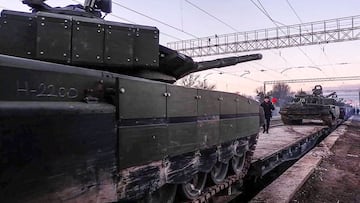Russia Ukraine conflict: Why careful reporting is so important
'War' has been in the headlines for nearly all of 2022, but the only person who knows if war will happen is not sat behind a laptop in the US.


The first story by the BBC on the current crisis in Eastern Europe between Ukraine and Russia was published back at the end of November 2021, describing Moscow as 'stoking tensions'. Fast forward three months and every newspaper has been emphasizing how Europe is closer to war than it has been since the 1990s. Headlines such as 'Last chance to stop war,' and 'Russia set to invade any day now' have contributed to a feeling that war is imminent. It's probably the reason you are reading this article now, having seen some of the reports over the last few weeks.
Near-uniform front pages of the papers in the UK predicting imminent large-scale Russian military action. In Russia we’d attribute such behaviour to Kremlin control over the media. In ‘the West’ a similar effect is achieved with intel briefings which journalists can’t verify
— Gabriel Gatehouse (@ggatehouse) February 12, 2022
And it's not just newspapers that are fanning the flames of war. Western governments have been telling citizens to leave Ukraine as soon as possible while they have been sending troops and arms to Ukraine with little regard for who they are going to. Ukraine, and Russia despite serious sabre-rattling, have been adamant that there will be no conflict in the east.
Related stories:
- Why is Wednesday an important date for the Russia Ukraine conflict?
- What are the potential consequences for the United States if Russia attacks Ukraine?
- Why is the US sending troops to Ukraine?
Language is crucial to understanding anything, from conflicts to discussions about how to prepare a cup of tea. Reporting on potentially seismic events needs to be much more careful considering the magnitude of what is being discussed. War is no simple matter, but some politicians and press outlets are not treating it with the seriousness required.
The press
One of the standout pieces of information throughout has been the 100,000 Russian soldiers 'on Ukraine's border,' information that makes it seem like tanks are in Ukrainian's back garden. The BBC produced a graphic in the last week showing how many of these 100,000 were new to the area, with the vast majority stationed there permanently. Clearly, bases are close to Ukraine due to Russia's involvement in arming separatists in Eastern Ukraine, but the notion given by the press and politicians was that this huge number of troops had just arrived to invade the next day.
The press has also made mistakes in mistranslations and failure to analyze sources. A quote from Ukrainian President Zelensky was mistranslated by saying war was to begin February 16, but was later found to be speaking ironically about the amount of reports from the west that war was to happen. Zelensky has consistently been downplaying the likelihood of war with Russia, urging western governments not to spread panic in his country.
IMPORTANT UPDATE from @JoshNBCNews : Walkback from Kyiv: Zelenskyy’s spokesman says when he said on Facebook that “we are told that February 16 will be the day of the attack,” Zelenskyy was merely referring to media reports. Told by the media, not by US, Russia, NATO etc…
— Tom Winter (@Tom_Winter) February 14, 2022
For journalists to publish claims without due diligence is bad at any time, but in a period where war could break out it is a serious problem. Clarity of information and fact is paramount in such a situation takes priority, not internet clout for publishing the first tweet that shots were fired.
The politicians
It isn't just journalists that have been dropping the information ball. Politicians in the west, despite protestations from people in the affected areas, have decried imminent war and sent troops to Eastern Europe to reinforce. No evidence has been made public, only that we should trust those in power that war is to be expected. Readers in the UK can cast their minds back to the last time a government made huge claims for war against Iraq in 2001, claims that proved false.
Related stories
Despite the apparent Russian withdrawal of troops on Tuesday morning, British Foreign Minister Liz Truss was on the airwaves saying war was still as likely as it had been the day before, while NATO echoed the same sentiment. It doesn't help how much you believe Ms Truss after she was embarrassed by veteran Russian Foreign Minister Sergei Lavrov last week after she told him Russia would never have sovereignty over the Voronezh region, a part of Russia for over 300 years. These are the politicians saying we should trust them, and they have offered the public nothing except showing they know little about even a map of Russia and Ukraine.
Professor Paul Rogers on structural reasons for sloppiness in defence reporting.
— Aaron Bastani (@AaronBastani) February 14, 2022
More than anyone else they are dependent on government sources - important point on @novaramedia pic.twitter.com/2fjY9OUOIs
This article makes no assertions for what is really happening between Russia and Ukraine, only that people should take every proposed fact with a pinch of salt; the only person who truly knows whether there will be war in Ukraine is the President of Russia, not a journalist or politician sat behind a cushy desk.

